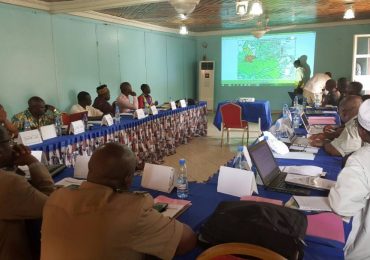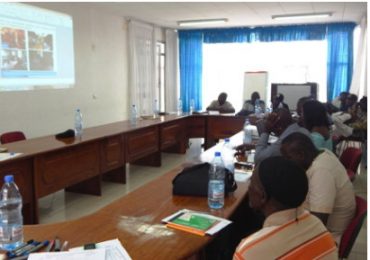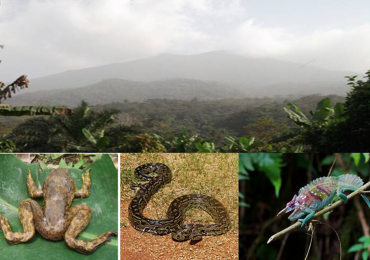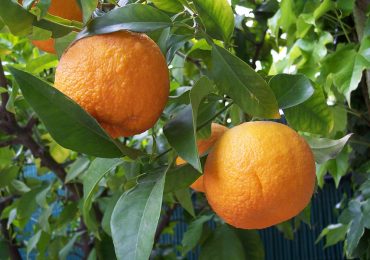Cameroon has been singled out as a country whose fish stocks are increasingly being contaminated with toxic mercuric waste discharged by industries in Douala in the Littoral Region.
By Yanick Fonki Ndeley
A scientific study carried out in two predominant high-fish-eating communities – Youpwe and Takele – on the outskirts of Douala between May and June 2012, indicates that Cameroon’s largest city and industrial hub is a mercury exposure hotspot.
Mercury is a heavy silver-colored, toxic metal existing in liquid form at room temperatures.
Medics say human ingestion of its most poisonous form, methyl mercury, typically via consumption of polluted fish results in the wrecking of the immune and nervous systems, and severe damages to developing embryos.
“Our conclusion is that the main source of contamination is fish, though there are other sources like some skin-lightening lotions, clay and artificial teeth

workshops. The Wouri estuary where most of the fishing of Douala is done is highly polluted with mercury from the various industries around,” said Dr. Jude Attah, co-author of the report.
The research was jointly done by experts from the Biodiversity Research Institute, the International POP Elimination Network and the Research and Education Center for Development [CREPD].
Results of the tests conducted at a laboratory in Maine, USA, revealed methyl mercury traces far beyond WHO limits.
Seventeen of the hair samples taken from 19 trial subjects evidenced levels reaching 3.8 micrograms per kilogram [or parts per million]; about twice the limit prescribed by the US Environment Protection Agency.
The two others displayed exceedingly elevated levels surpassing 540 ppm – over 500 times above the 1ppm tolerable methyl mercury concentration in the human body.
Mercury occurs naturally in geological deposits, volcanoes, alkali – a mixture of soluble salts found in arid soils and some bodies of water detrimental to agriculture – and also as an introduced contaminant in the environment from metal processing, gold mining, coal incineration and hospital wastes.
It is easily carried over vast distances in the atmosphere by wind and then deposited on land and water surfaces.
Some of the mercury that drops onto water surfaces from the air is converted by marine bacteria into methyl mercury.
Zooplanktons or microscopic animals drifting in great numbers in fresh or saltwater then gulp the methyl mercury and are in turn devoured by smaller fish, which are also prey for some larger fish.
At each stage in the aquatic food chain, the concentration of methyl mercury, which is much more easily absorbed than is excreted, is bio-magnified pending ingestion by humans.
“Our findings clearly illustrate the need for urgency in reducing mercury pollution in Cameroon. Fish is an increasingly essential food item for the majority of Cameroonians and our research demonstrates that methyl mercury contamination in humans is basically from fish,” said Dr. Gilbert Kouepouo, CREDP Coordinator.
The researchers recommend that governments in the region immediately enact legislation to constrain mercury-polluting industries to obtain equipment to clean contaminated environment, limit imports of raw materials containing mercury and impose industrial and hospital garbage inspection before disposal.
Since 2009, the United Nations Environment Program (UNEP) has been pushing for a negotiated global pact to progressively phase out and eventually eliminate mercury emissions in the environment.
The venture open to governments, intergovernmental organizations and the civil society is due completion this year.
“A global, legally binding treaty translated into national laws and supported by creative financing, can accelerate and scale up such responses and put the planet and its people on track to a more sustainable world,” says Achim Steiner, UN Under-Secretary General and UNEP Executive Director.
Meantime, Cameroon’s fish demand and supply gap continues to widen. The country’s annual harvests of 180,000 tons remain far below demand evaluated at 300,000 tons.
In 2011, US$194 million was spent on fish imports from Mauritania, Morocco and China among others. Experts say the figure is bound to soar in coming years as the population surges alongside rocketing meat prices
Soaring costs of meat, currently selling at about US$6 (circa 3000 francs cfa) per kg across Cameroon have obliged the bulk of its mostly broke 20 million dwellers to bank on relatively low-priced fish for balanced diets.
In other words, the number of people exposed to methyl mercury poisoning will increase until the research recommendations are legislated.









